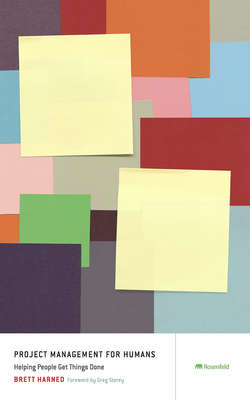Читать книгу Project Management for Humans - Brett Harned - Страница 8
На сайте Литреса книга снята с продажи.
INTRODUCTION
ОглавлениеWhat do you want to be when you grow up?
It’s a question we’re asked from a very young age. I knew the answer as soon as the question was posed: pediatrician.
I spent the earliest years of my school career preparing myself for medical school, without ever actually thinking about why I wanted that job. When I finally enrolled in college as a pre-med student, I decided to go on rounds with my family doctor just to see what it was all about from the physician’s point of view.
Best idea I ever had, hands down.
I won’t speak of the things I saw, but I will say that I left the office before lunch and went home to tell my parents it was not the job for me. When they asked, “What is the right job for you?” I had no real response. So, after a year of trying (forcing) biology as a focus, I changed my major to English. I liked writing and thought that would be a good place to start.
When I graduated, I went to the career services office at my university and they handed me a giant book of jobs that English majors might take. That wasn’t helpful, so I found my own opportunity at a start-up as an editor. It was a unique role, because I was able to test my strengths: writing copy, managing video shoots, learning HTML and Flash, creating site maps and wireframes, using Photoshop . . . managing projects. It was an experience I’d never give back, even if I did have to go through the highs and lows of working for a startup that eventually fizzled out, dashing my dreams of becoming a 22-year-old millionaire.
When I left that job by way of a layoff, I found myself looking for focus. I reflected on what I did best so that I could find the right fit for me. In the end, I recognized that I was:
• Organized
• Curious to learn more
• Willing to help others
• Comfortable asking uncomfortable questions or addressing tricky situations with people and projects
• Courageous
• Detail oriented
• A connector
• A communicator
It took me a few years to find the right fit, but I finally found my calling: project management. For the reasons above, and others to be discussed in this book, I’ve found that it takes a certain something to be a project manager, and it’s partly ingrained in you and partly learned.
NOTE KNOW YOUR STRENGTHS
I’ve always kept that list of my characteristics in my back pocket, because I knew that it would help me to zero in on what my strengths are as an individual. It has also helped me to assess the “fit” on any potential job and project opportunities. If you’re having a hard time figuring out the right role for you, try doing the same and making some connections in your community to help you land in the right role. It’ll make you happier.
Project managers reading this excerpt will most likely identify with a similar story. Many PMs—particularly digital project managers—fell into the role with little to no guidance or formal training. Like many before us, we have worked hard to do what feels right in the role, and have adapted systems, processes, frameworks, and guidelines to benefit us, our teams, and our projects. This book embraces that DIY style of project management: being deeply involved, testing ideas and methods, failing, and coming out better. Those are ideals that resonate with anyone in the digital industry. We’re still coming up with new ways of working, and we always will, because we innovate.
NOTE TRY SOMETHING NEW
Because digital projects are still somewhat “new,” the way they are managed is also new. So the minute you come up against the “It’s the way we’ve always done it” comment, challenge it by referencing all of the advancements that have been made in the industry. After all, advancements often call for new ways of thinking and new approaches.
Whether you accept it or not, you are a project manager. Sure, you may identify as a designer, content strategist, developer (or any of the many roles and titles there are in our industry), but as a human being, you are a project manager. Think about the most basic things you do in life, and you can apply project management to all of them: making dinner, moving, applying to college, attending a conference, even a night out with friends or a vacation. You’re required to plan, estimate, and communicate. And it’s not that hard.
This book explores the core functions of project management through the lens of everyday interactions and situations, because there is an aspect of project management in a lot of what we do as humans. The personal stories included in this book are intended for you to have a laugh (sometimes at my expense) and help you draw the connection from daily, nonwork situations to real-life project situations. By calling out these topics in unique, personal scenarios, you’ll find that you do not have to hold the title “project manager” to actually be a project manager. In fact, you’re likely managing projects—and dealing with a variety of issues—in some way every day. And no matter what you do or whom you work with, if you follow some of the advice herein, you, too, can be a successful project manager.
